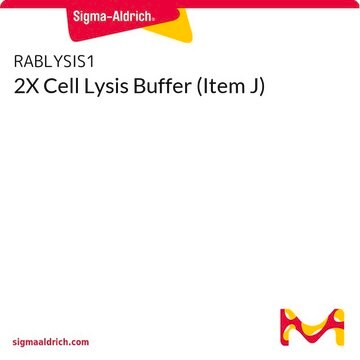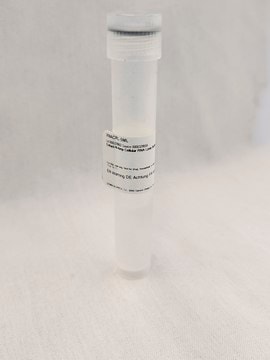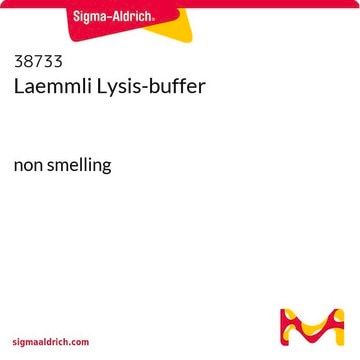L3289
Lysis solution for blood
sufficient for 100 reactions, for molecular biology
Synonym(s):
Blood direct PCR, Blood lysis buffer, Extract-N-Amp blood direct PCR lysis solution
Sign Into View Organizational & Contract Pricing
All Photos(1)
About This Item
UNSPSC Code:
12352200
NACRES:
NA.25
Recommended Products
grade
for molecular biology
form
liquid
usage
sufficient for 100 reactions
storage temp.
−20°C
Related Categories
General description
Lysis solution for blood in combination with neutralization solution for blood (N9784) aids in rapid extraction and neutralization of DNA from whole blood, whole blood dried on a blood card, and cultured mammalian cells.
This lysis solution is a component of the Extract-N-Amp™ and the REDExtract-N-Amp™ Blood PCR Kits
This lysis solution is a component of the Extract-N-Amp™ and the REDExtract-N-Amp™ Blood PCR Kits
Application
Lysis solution for blood has been used for lysis of blood cells for DNA extraction prior to polymerase chain reaction (PCR) amplification. It has also been used for the isolation of genomic DNA for CRISPR-Cas9 gene editing.
Legal Information
Extract-N-Amp is a trademark of Sigma-Aldrich Co. LLC
REDExtract-N-Amp is a trademark of Sigma-Aldrich Co. LLC
related product
Product No.
Description
Pricing
Signal Word
Danger
Hazard Statements
Precautionary Statements
Hazard Classifications
Eye Dam. 1 - Met. Corr. 1 - Skin Corr. 1B
Storage Class Code
8A - Combustible corrosive hazardous materials
WGK
WGK 3
Flash Point(F)
Not applicable
Flash Point(C)
Not applicable
Certificates of Analysis (COA)
Search for Certificates of Analysis (COA) by entering the products Lot/Batch Number. Lot and Batch Numbers can be found on a product’s label following the words ‘Lot’ or ‘Batch’.
Already Own This Product?
Find documentation for the products that you have recently purchased in the Document Library.
Customers Also Viewed
Identification by random mutagenesis of functional domains in KREPB5 that differentially affect RNA editing between life cycle stages of Trypanosoma brucei
McDermott S M, et al.
Molecular and Cellular Biology, MCB-00790 (2015)
Identification by random mutagenesis of functional domains in KREPB5 that differentially affect RNA editing between life cycle stages of Trypanosoma brucei
McDermott S M, et al.
Molecular and cellular biology, MCB-00790 (2015)
Shuhan Chen et al.
Stem cell research, 45, 101804-101804 (2020-04-28)
Mutations in the Leucine rich repeat kinase 2 (LRRK2) gene are found in both familial and sporadic Parkinson's disease (PD), and are also associated with immune-related disorders including Crohn's disease (CD) and leprosy. We have generated two homozygous LRRK2 knockout
Meng Zhang et al.
Stem cell research, 41, 101602-101602 (2019-11-08)
Loss of function mutations in PARK2 (encoding PARKIN) cause autosomal recessive Parkinson's disease (PD), which often manifests at a juvenile age. Molecular and biochemical studies show that PARKIN functions as an E3 ubiquitin ligase controlling mitochondrial homeostasis. Yet, the exact
Huiling Wu et al.
The Journal of clinical investigation, 117(10), 2847-2859 (2007-09-15)
Ischemia/reperfusion injury (IRI) may activate innate immunity through the engagement of TLRs by endogenous ligands. TLR4 expressed within the kidney is a potential mediator of innate activation and inflammation. Using a mouse model of kidney IRI, we demonstrated a significant
Our team of scientists has experience in all areas of research including Life Science, Material Science, Chemical Synthesis, Chromatography, Analytical and many others.
Contact Technical Service














